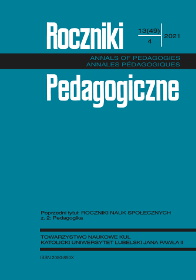The Work of Parents in the Countryside in their Childhood Memories of Generation Y
Main Article Content
Abstract
Work is one of the main forms of human activity. The work of Millennials in their childhood memories is present and strongly accentuated. Such memories can make it possible to recreate the circumstances in which the work culture was shaped in the rural environment. Based on biographical reflections, it is possible to reconstruct the subjective experiences of work in the conditions and circumstances of childhood. In the case of the Millennials’ generation, such period was in the nineties, i.e. the initial period of systemic transformation. In the rural environment, it was specific. The life and professional paths as well as the personal profiles of rural children of those times are related to the experiences they acquired at that period of their lives. Appealing to autobiographical reflections from childhood broadens the knowledge of “those times” and shows individual workrelated experiences. It also enables our better knowledge and understanding of later Millennials’ social, (especially professional) functioning, in their adulthood. In the memories of work from the childhood of Millennials coming from rural environments we can clearly notice the widespread overworking of their parents, their work fatigue, and the parents’ frequent additional work on their own farms which were run for their own needs. The parents did not have any free time or time for their children, because their professional and farm work was the content of all the following days, even holidays. The memories of the work of individual parents (mothers and fathers) are clearly different – fathers were usually focused on their professional work, mothers – apart from their professional work, carried the burden of running their homes. Children were also involved in the work. They were usually responsible for taking care of their siblings, cleaning and self-service work, as well as the assistance with seasonal field work. There are no new electronic media or electronic technologies in the childhood memories of the oldest Millennials, called “the digital generation”. Their parents’ work was usually manual. The children remember it as often very hard, exhausting, but also necessary work. It was a source of income and was treated that way by the parents who did it with high responsibility and commitment. They did not complain about its excess and the fatigue it caused.
Article Details
References
Cichorzewska, M., Niewiadomska, A., Sobolewska-Poniedziałek, E., Zimnoch, K., Ziółkowska, B. (2015). Zarządzanie wiekiem. Aspekt regionalny, instytucjonalny oraz organizacyjny. Lublin: Politechnika Lubelska.
Klementowska, A., Flaszyńska, E. (2018). Rynek pracy a zmiany pokoleniowe (stan i prognozy). Zielona Góra: Uniwersytet Zielonogórski – Instytut Inżynierii Bezpieczeństwa i Nauk o Pracy, Polskie Towarzystwo Profesjologiczne.
Kozarzewski, P. (2010). Zasoby i strategie gospodarstw domowych u progu kryzysu. W: M. Jarosz (red.), Polacy równi i równiejsi (s. 119-168). Warszawa: Instytut Studiów Politycznych PAN. Lalak, D. (2010). Życie jako biografia. Podejście biograficzne w perspektywie pedagogicznej. Warszawa: Wydawnictwo Akademickie ŻAK.
Maciołek, D. (2019). Niepokorne pokolenie milenium. Czego pragnie na rynku pracy? Warszawa: Wydawnictwo Difin SA.
Mały Rocznik Statystyczny Polski. (2002). Warszawa: GUS.
Mały Rocznik Statystyczny Polski. (1999). Warszawa: GUS.
Maruszewski, T. (2005). Pamięć autobiograficzna. Gdańsk: Gdańskie Wydawnictwo Psychologiczne. Sokólski, M. (2004). Demografia zmiany społecznej. Warszawa: Wydawnictwo Naukowe Scholar. Piorunek, M. (2009). Bieg życia zawodowego człowieka. Kontekst transformacji kulturowych. Poznań: Wydawnictwo Naukowe UAM.
Rachalska, W. (1987). Problemy orientacji zawodowej. Warszawa: PZWS.
Radziewicz-Winnicki, A. (2005). Społeczeństwo w trakcie zmiany. Rozważania z zakresu pedagogiki społecznej i socjologii transformacji. Gdańsk: Gdańskie Wydawnictwo Psychologiczne. Rybczyńska, D. (1995). Poziom życia rodzin a poczucie ubóstwa. Badania socjologiczne w rejonie Polski zachodniej. Zielona Góra: Wydawnictwo Wyższa Szkoła Pedagogiczna im. Tadeusza Kotarbińskiego w Zielonej Górze.
Szajek, S. (1989). System orientacji i poradnictwa zawodowego. Warszawa: Państwowe Wydawnictwo Naukowe.
Szpak, E. (2013). Mentalność ludności wiejskiej w PRL. Studium zmian. Warszawa: Wydawnictwo Naukowe Scholar.
Szpak, E. (2005). Między osiedlem a zagrodą. Życie codzienne mieszkańców PGR-ów. Warszawa: Wydawnictwo TRIO.
Wiatrowski, Z. (2005). Podstawy pedagogiki pracy. Bydgoszcz: Wydawnictwo Akademii Bydgoskiej im. Kazimierza Wielkiego.

